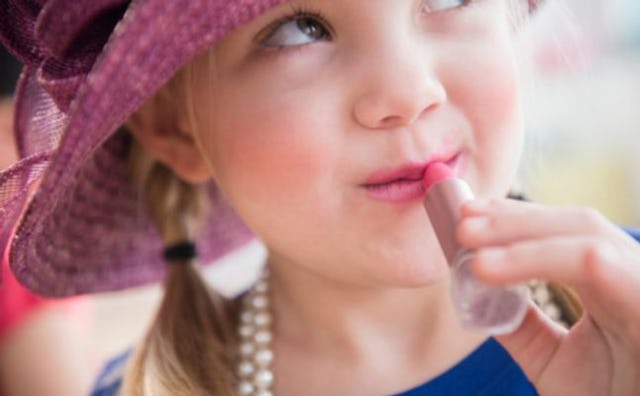Raising a Girl as a Survivor

Lately, I find myself up against the effects of my childhood sexual abuse, not only as a woman, but now as a mother raising a girl.
“Momma, Can I put on some make-up?”
I tell my daughter she is beautiful with out it, but “Sure honey, what’s the harm?”
Internally, I am struggling with ideas of beauty and sexuality and safety and how all of this will play out in her life. I can’t help but want to tell my daughter no, she can’t wear make-up; and in the years ahead of her, no, she can’t wear anything that sexualizes her in any way. I want to protect her as much as I can against catching the attention of a predator – even knowing that idea is a farce. Predators rarely take to the streets and prey. They wait for opportunity, usually within surroundings that are comfortable to a child.
At her age, I became a sexual object to some one. I know enough now to know, it had nothing to do with what I looked like, but more of the opportunity given to a man with a sick addiction and no self control. It’s not what the child looks like, but how vulnerable she is.
Does every woman grow hollow inside when she hears a man tell her daughter that she looks pretty? It shrinks me into a scared ten year-old little girl, now wondering if this man too will do to me what other “good” men have done. Except, it’s not about me anymore. It’s about my daughter. It’s about the compulsive urge I have to protect her from ever being preyed upon, like I was.
I could be wrong. Perhaps the guy at the cook out that complimented my daughter is of no harm. But when I got that kick of uneasiness in his presence, I paid attention. It doesn’t occur every time I or my daughter are around men. Only sometimes. So every time, I listen and know that whether the man involved is her best friend’s father, the town pastor, a friend’s brother or even someone related to her, I will never let her be in a position to be groomed by him.
I have to teach my daughter how to listen to and feel that sixth sense that we all have. The most effective tool she can possess is trusting herself. For now, we call it the “uh-oh” feeling. It’s an idea a school social worker taught me while interning at an elementary school. I connected with that “uh-oh” feeling because I recognized it. It’s what made me keep a secret for over eight years. I want my daughter to not be scared of that feeling like I was, but to pay attention to it and to react to it no matter what.
The most difficult part to all of this is when that uneasiness sets in at times I know are irrational, like when my husband helps our daughter with her shower or is having a playful game of tickle monster with her. I have to convince myself that in spite of what the literature and statistics say, I will never continue the cycle of abuse – as the victim or the abuser. I have to pull myself out of the hole these innocent events push me in, and recognize the irrational fear setting in.
After my failed search for stories on what it’s like to live and experience motherhood as a survivor of childhood sexual abuse, I was reminded how quiet survivors are. I know the role that shame has in keeping it that way, but a discussion on the effects of the abuse that resurface, or suddenly arise, when we become mothers is something we need to talk about. It’s vital to our ability to raise healthy girls.
* * *
“Momma, If a boy kisses you, does that mean he loves you?”
Perhaps the “everything happens for a reason” rhetoric finally makes sense to me now. I am able to see the damage that is done, when our daughters are told yes to this question. Love is more than a kiss, or any contact with her physical body. Teaching her to equate love with either, implies she is suppose to love, in the presence of the other. That doesn’t leave much room for choice.
“Baby, a boy kisses you because he chooses to kiss you, it doesn’t always mean he loves you. And a boy, or any one else, should never kiss you unless you want him to. If he does, I highly encourage you to punch him in the nose.”
* * *
(I am also the mother of a son and recognize the need and desire of mothers everywhere to keep their son’s safe; as well as, their daughters. This story is more in line with the effects of the abuse and raising my daughter. That doesn’t mean, I am concerned any less about my son or the numerous male survivors struggling with their own stories.)
This article was originally published on